- Home
- David Leavitt
Martin Bauman Page 3
Martin Bauman Read online
Page 3
Shortly after this episode he assigned us one of his rare in-class exercises: each of us was to write a one-sentence description of someone else in the room, then read it aloud, after which the rest of us would try to guess who it was that was being described. I have no memory of what I wrote myself that night. What I do recall is that Mittman described a very beautiful girl named Thompson (with Flint we were all on a last-name basis) as “silvery”; also, that the boy with the wire-rimmed spectacles, when his turn came, described someone as being “ready to pounce on a sure thing.” At first I couldn’t imagine to whom he was referring, until Baylor said, “That’s Bauman.” A murmur of concurrence followed. “Bauman,” the choristers repeated. And Flint agreed: “No doubt about it. Bauman.”
Ready to pounce on a sure thing. When I was a child the boys at my bus stop used to call out “Faggot!” as I approached in the morning with my lunch box. Just as they intuited from my behavior—in particular, from the ways I interacted with them—a facet of my identity of which I myself was still unconscious, so the boy with the spectacles, with that uncanny prescience of peers, had detected a strain of ruthlessness in my character that would later blossom into fanatical professionalism, but remained for the moment, as it were, latent, unbudded. For I had a lot invested, in those years, in an idea of myself as innocent and goodhearted; nor was I far off the mark, since the truth is, ruthlessness of the sort I displayed can derive from innocence and goodheartedness; specifically, the innocent, goodhearted craving of the child for adult approval.
The boy with the spectacles attracted and scared me. I’m sorry to say that today I don’t remember his name, even though I often thought about him then, in particular about the way his chest hair—the color of champagne—seemed literally to bubble out of the collar of his sweater. A few years later I ran into him in New York, and he told me almost boastfully that after class that first night Flint had approached him to find out where on campus he might go to get some “pussy.” That was the word he used: “pussy.” Our conversation left me with the impression that between him and Flint there had developed one of those buddyish intimacies to which the joint pursuit of women lends an erotic edge. I pictured them prowling the campus like male dogs who have picked up the scent of a female in heat, an image the contemplation of which left me feeling emasculated, excluded, and faintly aroused.
I suppose now that I was a little in love with Flint. And why shouldn’t I have been? He was a good-looking man, lean and surly, with hands like broken-in leather gloves. Nor did his reputation as a womanizer in any way detract from the effect he had on me. On the contrary, it served only to intensify my idea of him as an avatar of masculine virility. For what I wanted from Flint, I told myself, wasn’t so much sex as permission—to write, to think of myself as a writer. Today I recognize the degree to which this need for his approbation encoded a desire I had heretofore never admitted: the desire for men— and more specifically, for older, fatherly men who didn't desire me. (About this desire I felt a sense of shame that persisted even after I had come out, leading me to pretend that I was attracted to “nice” boys my own age, instead of the burly men in their thirties and forties who figured in my daydreams.) A long time later, when I was living with Eli Aronson, and having always to come up with new sexual fantasies by means of which I could maintain the façade of mutual lust upon which our relationship depended, I started for the first time to have explicitly sexual thoughts about my former teacher. Giving Eli a blowjob in his loft on Elizabeth Street, I’d find myself back to my college dorm room. It would be late at night—Wednesday night—and someone would be knocking at the door. I’d answer. “Bauman, Bauman,” Flint would say, “I’m desperate. I can’t find any pussy.” And I would invite him in, sit him down on the bed (he would require help with his bad leg), undo his pants, and take his penis—long, I imagined, and not terribly hard, though ruddy—into my mouth...
What was exciting to me about this fantasy (and what made it one of the ones, in those years, on which I could count even when all else failed to carry me through the bouts of fretful lovemaking on which Eli and I so perversely staked our happiness) was the fact that in it, Flint showed no sexual interest whatsoever in me. Instead I was only a last-ditch alternative, a cavity into which he might pour his overarching need for that realm of feminine receptivity to which the boy with the spectacles had alluded when he’d used the word “pussy.” “Help me out, Bauman,” Flint would say in this fantasy: never “I want you” or “I love you.” That would have spoiled everything. Indeed, if someone had told me that Flint was secretly homosexual, or that he was in love with one of the boys in the class, I think I would have lost all respect (not to mention desire) for him, instead of living, as I did, for the day when he might let me call him mentor.
As for his real life—his fife in New York—I knew almost nothing. That he was married and had several children, one a sophomore at my university, I had divined from casual references he’d made during class. The names of these children, however, he never shared, just as he refused to give us (or anyone) his home address and phone number. Like many great and neurotic men, he had a persecution complex, and feared lest some madman—probably a writer whose stories he had refused to publish in Broadway—should track him down and shoot him in his bed.
Even murkier were the details of his early years. For example, though it was assumed from a certain lilt in his accent that he was southern, no one I asked seemed to have any idea where exactly he’d grown up, where (or whether) he’d gone to college. Baylor said she’d heard that “Stanley Flint” was not his real name, while Thompson, who had connections in the magazine world, claimed to have it on authority that he’d done time in prison. I wasn’t sure whether I believed any of this; nor, if truth be told, did the details of his youth interest me nearly as much as the mystery of how he spent all the days of the week that weren’t Wednesday, those days when he tarried in realms of sophistication to which, I felt certain, he was habituated, and which I longed to know. Unfortunately, about these points he was equally unforthcoming—not only, I suspect, because he wanted to protect his privacy, but because his enthusiasm for writing itself rendered all other aspects of the literary life, in his mind, superfluous. Thus he might casually mention having run into Susan Sontag “at a party,” but only as a way of introducing some trenchant observation about Sontag’s work—an observation the most basic rudiments of which I would fail to take in, so awed was I by the very idea of a party at which Susan Sontag would be a guest. Or he might tell us that he’d been at dinner with a young writer named Liza Perlman, the daughter of the literary agent Sada Perlman, who seemed to represent all his favorites. Though only twenty, she had just published her first novel, Midnight Snacks. “Look at this,” Flint would taunt, thrusting in our faces the book’s backside, from which Liza’s benign, oddly asymmetrical face, framed by red hair, stared out. “A junior in college, and already she has a book out. It makes you jealous, doesn’t it? But could you do better?”
The fact was, I had no idea if I could do better. Indeed, so dazzled was I by Liza Perlman’s public image (and what was that photo on the back of the book but a literal public image?) that I barely registered her reality as a human being with whom I might someday compete. Though later she would become an intimate fixture of my life, Liza existed for me in those days less as a person than as a sort of fleshly emanation of that city in which she had gone to dinner with Stanley Flint, and in which I, too, hoped someday to live; indeed, had hoped to live ever since the summer my mother had taken my sister and me to spend two days at the St. Moritz Hotel, two days during which we did only the usual tourist things—shopped, and went to Broadway shows, and ate lunch at Rumpelmayer’s, where a waitress, when I asked for more water, snapped, “You’ve had your quota.” And yet even this glimpse of New York had been enough to provoke in me a hunger for the city that lasted the next twenty years.
“And another hundred people just got off of the train,” Marta (in the gui
se of my sister) sang in a community theater production of Company to which I went that autumn. It was curious: watching her from the audience, I wanted to be one of those hundred people, for even then the city’s famed and pitiless indifference to new arrivals appealed to me at least as much as the array of beguilements, sexual and cultural, with which it enticed—movies and plays, lovers and restaurants, that whole landscape of anonymous distraction through which I saw myself wandering, not so much invisible as unrecognized, a hurtling atom in some charged and fluid field of possibility.
That night I began nurturing a dream of the adulthood I would have in New York, a dream in which I lived on a high floor of a new skyscraper, in a perfectly round apartment the entirety of which was taken up by a circular mattress covered with pillows, and from the cushioned heights of which I might look out, each evening, at the brilliant light show that somehow I possessed even as it possessed me, along with Stanley Flint and Liza Perlman and all its other denizens. Denizens, not citizens: already I was thinking of New York as a place to which I was doomed. And as it turned out, I wasn’t far off the mark. “It’s ruined me for anyplace else,” I used to tell people in those years when I really did live in a high-rise (albeit not in a round room), the years when I hardly stepped off the island of Manhattan, and felt sorry for anyone who had the misfortune to live anywhere else (especially—because the most vivid horror is always that nearest to home—in Brooklyn or Queens). I couldn’t imagine that a day would come when I’d view the city as being at least as narrow and provincial as that landscape of my adolescence which, like the protagonists of certain stories by Willa Cather, I’d thrown over, thinking myself too good for it. And yet how could I have recognized this, when I insisted so stubbornly on endowing New York with the power to authorize my very selfhood?
One advantage of my university, for me, was its relative proximity to “the city,” which was only an hour east by bus. Already I went fairly often, usually with my roommate, Jim Sterling, whose parents lived in a vast apartment on Central Park West. These weekends we devoted almost exclusively to the consumption of culture: museums and movies, and on Saturday nights, the theater, usually serious plays, the latest works by Marsha Norman or David Hare, instead of the “shows”—things like Cats and Evita—to which my mother had taken my sister and me, and which I now disdained. Jim’s ambition was to write for the culture section of the New York Times, and so in the mornings, over Sunday brunch, he would amuse his parents and me with disquisitions on whatever we had seen the night before—long monologues the thread of which I would gradually lose as I stared over the platter of bagels at Central Park, thinking about my own adolescence, how meager and colorless it seemed when compared to Jim’s, which had been crowded with activity: visits to the Temple of Dendur, and Radio City Music Hall, and the Museum of Natural History. Not that I had grown up in Willa Cather’s Nebraska; indeed, our pleasant Seattle neighborhood was by any standard other than my own a utopia. I exaggerated horribly—as if the future I longed for required as its prerequisite a lonely and impoverished past.
Toward the end of that semester I entered my story about Aunt Bessie in a fiction contest that had been initiated a decade earlier by a famous television reporter in memory of his son, who had died in a mountain climbing accident. The story won—the first time the prize had ever been given to a sophomore. Not surprisingly, everyone else in Flint’s seminar had entered the contest too. My classmates greeted me, when I arrived for our last meeting, with a sort of low snarl of congratulations: good wishes beneath which I could detect the distinct and scary purr of feline rancor.
The weather was unseasonably warm that May. Outside tulips, undeterred by the late snowstorms, bloomed with a fretful vigor. The air through the open window of the seminar room smelled sweet, while on the blackboard the subjunctive conjugation of the verb piacere—last remnant of that Italian class on which I had eavesdropped through the semester—testified to the human capacity, mysterious only when you think about it, to learn. Even Flint, dressed in a pink shirt and a jacket of greenish tweed, seemed to be in a sweet mood, at least to judge from the warmth with which he saluted us. Indeed, so kind was his welcome that for the first time I wondered whether the savage aspect he had shown that first January night might have derived not from some streak of sadism in his character, not even from an idea he had about teaching, but from simple shyness.
I remember that in keeping with an old tradition at the school, everyone had brought food or drink to this last class: bags of potato chips and bottles of Coke and Sprite and plates of cookies, which we spread out over the seminar table like goods at a bake sale. Only Flint did not eat. Instead he talked. “Children, children,” he intoned, his plaintive voice betraying a nostalgia to which I would not, at first, have thought him susceptible. “How quickly things end. It’s hard to imagine that only a few months have passed since our first evening together ... yet this is the nature of things. You have been a blessing to me, every one of you. Of course you shall all receive As, and if there were a higher grade in the universe I would bestow it upon each of you. I wish I could give you more than As. But I can’t—only this little letter that may be of some use one day, along with a few parting words, a last assessment, some advice to take or ignore as you see fit.”
All sounds of consumption ceased. I think that what surprised us wasn’t so much this announcement itself as the fact that he was planning to give these final evaluations in class. Yet such, apparently, was his typically unorthodox plan, for now he began to make his way around the table, from student to student, granting each of us—even those who, having never gotten past sentence one, had given up trying—an appraisal at once judicious and generous, a liberal dollop of that balm he had previously dispensed only in tiny quantities, on the rare occasions when one of us wrote something that pleased him.
As for me, I waited. Because—teacher’s pet that I was—I was seated immediately to his left, I knew I would be the last to be addressed.
My turn came around ten. “Bauman,” he began, turning his chair toward mine and stretching out his legs. “Bauman, Bauman, Bauman. What can we say about you? You have won the prize.”
Silence. Was this meant as congratulations?
“You have pulled the brass ring, and now you get to ride the merry-go-round again. In fact, I don’t doubt but that you’ll be riding the merry-go-round the rest of your life.” (Laughter.) “At first I wasn’t sure what to make of you. You seemed so eager, and so incompetent.” (More laughter.) “But then you got ahold of something and didn’t let go. And I’ve got to applaud you for it. You’re fearless. You know what you want. That’s why of all the people in this room you’re the only one I feel certain will make a success of himself as a writer. And yet ... of course there’s an ‘and yet,’ isn’t there?” (Still more laughter. Flint’s smile disappeared.) “I fear for you, Bauman. You are eminently corruptible. You can tell a story, but you haven’t become serious, and worse, you don’t seem to care about becoming serious. And once you’re out there, in the marketplace ... I’m sorry to say it, but it’s easy for me to imagine you turning into a hack, settling for cheap success, and not because you’re greedy, but because you desire too desperately to please.” All at once, to my shock, he took my hand. “If you prove me wrong, I’ll jump for joy. If you don’t, I ask you only to remember this voice. Remember that I’ve never said a word to you out of self-interest, or told you only what you wanted to hear.”
The room went silent. Quietly Flint removed his glove-leather hand from mine. “And now,” he said, turning away from me, “I bid you all farewell. Stay in touch. As you know I don’t give out my home address. Nonetheless you can always reach me care of the English department here. The magnificent Mrs. Hall, the department secretary, has promised to forward everything along.”
Standing, he put on his coat.
“Aren’t you staying for the party?” Mittman asked.
“No, no,” Flint answered sadly. “I—” And shaking
his head, he left. We were alone suddenly, with all that food, and in my case, a consciousness that I was being stared at—not with envy, no longer with envy—but with pity.
Pleading a final to study for, I fled. I went back to my room, where I started packing: in just a few days I would be leaving for New York, where I’d begin that summer internship at the publishing house for which I (and not Lopez) had been selected. And yet I couldn’t concentrate on my suitcases tonight. Instead, sitting at my desk, I pulled from the drawer the letter I’d just received from the news reporter, congratulating me on my prize. “Your story is both delightful and professional,” he’d written, just as Flint had said that of all the students in the class, I was the one most likely to find success as a writer: words at the utterance of which a current of pride had surged through me, a sensation of heady potency that I now tried to revive, to re-feel in its original purity, before his subsequent admonishments had snuffed it out.
Anyway, were Flint’s warnings fair? Leaning back, I tried to analyze my behavior over the course of the semester. All I had done, it seemed to me, was write a story he had liked, and win a prize; yet now he reproached me ... and why? People forgive talent everything except success: Flint himself had told us that. Wasn’t it possible, then, that in castigating me, he was merely illustrating his own maxim, giving voice—he whose work had come to so little—to an envy not only of me, but of all of us, of all that earnest potential, so far unsullied by spite, that I and my classmates, in our eager youth, personified?
That night, I committed the first of the many acts of betrayal that would punctuate the next twenty years of my life. Not that I denounced Flint, or called up Lopez to tell her she had been right all along: I did neither. And yet it is often the subtlest forms of defamation that prove, in the end, the most pernicious. For Lopez’s campaign against Flint, at least, had had the advantage of being up front and bold. My own, on the other hand, was underhanded, and consisted chiefly in telling the many people I met that summer in New York that though, of course, Flint was a genius—this went without saying—he was also a demagogue, petty and self-interested, and always trying to make his students dependent upon him, so that when or if they became successful, he could claim credit for their fame, and thus steal a portion of the recognition his own work had never earned him. (Partly true—which in no way absolves me of the charge of defamation. Anyway, the truth was not my goal. My goal was revenge.)

 Shelter in Place
Shelter in Place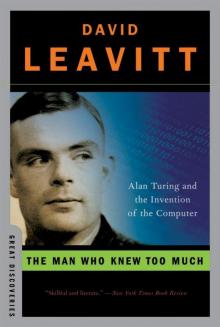 The Man Who Knew Too Much: Alan Turing and the Invention of the Computer (Great Discoveries)
The Man Who Knew Too Much: Alan Turing and the Invention of the Computer (Great Discoveries)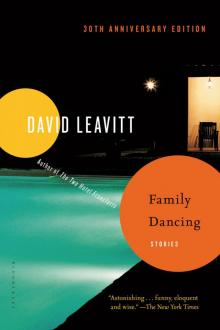 Family Dancing
Family Dancing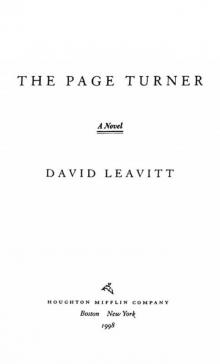 Page Turner Pa
Page Turner Pa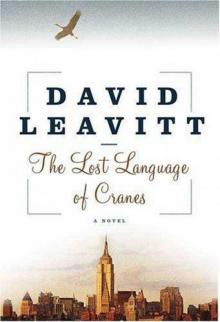 The Lost Language of Cranes: A Novel
The Lost Language of Cranes: A Novel The Body of Jonah Boyd
The Body of Jonah Boyd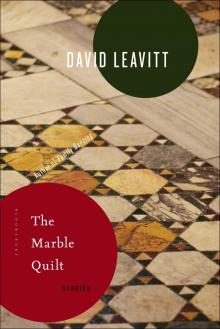 The Marble Quilt
The Marble Quilt In Maremma
In Maremma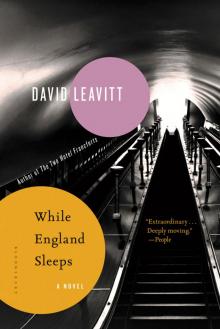 While England Sleeps
While England Sleeps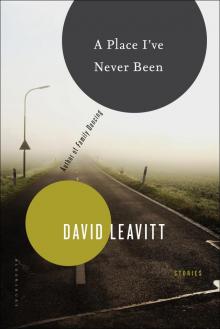 A Place I've Never Been
A Place I've Never Been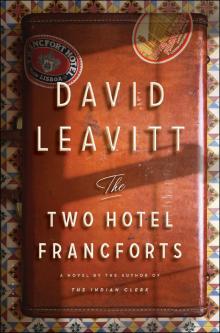 The Two Hotel Francforts
The Two Hotel Francforts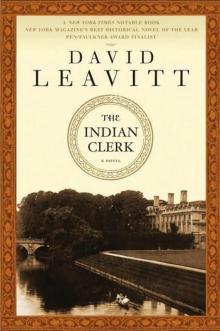 The Indian Clerk
The Indian Clerk Florence
Florence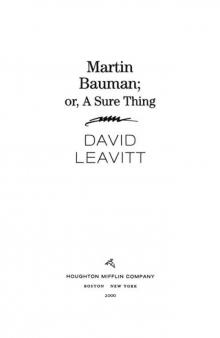 Martin Bauman
Martin Bauman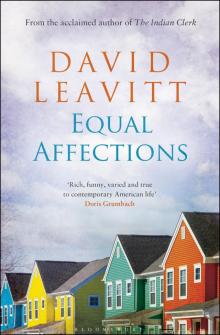 Equal Affections
Equal Affections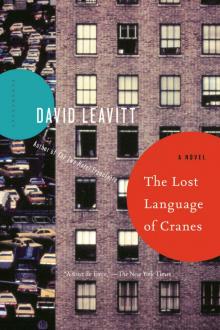 The Lost Language of Cranes
The Lost Language of Cranes Arkansas
Arkansas